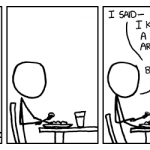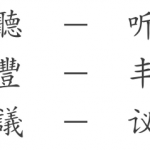Articles in the ‘Advanced’ category Page 38
-
The 10,000 hour rule – Blood, sweat and tears
The 10,000 hour rule is quite simple. It states that it takes roughly 10,000 hours of practice to become really good at something. The most important lesson here is that talent is far less important that people think. Even towering geniuses work very hard. Blood, sweat and tears are what counts in the end, not talent.
Read → -
Use the benefits of teaching to boost your own Chinese learning
Teaching is a very powerful way of learning. Explaining complicated topics with simple language helps you grasp them and remember them. If you don’t have someone to teach, you can imagine that you have and teach yourself. Making simple explanations explicit works almost as well as real teaching.
Read → -
When perfectionism becomes an obstacle to progress
Perfectionism is usually regarded as something positive, perhaps even necessary. Scoring 100% on an exam is good, isn’t it? No, it’s not. In this article, I explain why perfectionism is bad when learning a language. Aiming for 90% is far better than aiming for 100%. This is being smart, not lazy.
Read → -
Making progress in Chinese in spite of praise
Praise is a double-edged sword. On the one hand, it’s encouraging and makes it more rewarding to study. On the other hand, however, if you use other people’s praise as a true indication of your own ability, you’re in deep trouble. Feel encouraged, but it’s essential that you don’t trust native speakers when they tell you your Chinese is great!
Read → -
Learning simplified and traditional Chinese
Learning traditional characters if you know simplified or vice versa is a lot easier than beginners tend to think. Generally, you don’t need to worry, because at an advanced level, learning both is quite easy. This article is about simplified/traditional and how to learn both.
Read → -
Chinese reading speed: Learning how to read ten lines at a glance
Reading quickly is useful when taking tests and in any situation where you want consume large volumes of test. However, simply reading a lot is not the most efficient way to reach high speeds, you actually need to focus on reading speed to do that. In this article I discus various methods, tips and tricks, along with some thoughts on goals and problem analysis.
Read → -
Mapping the terra incognita of Chinese vocabulary
When it comes to vocabulary, it is sometimes difficult to cover all the necessary areas. If we move on to more advanced levels, we need to make sure that we actively strive to plug the holes that might exist on more basic levels. This article is about strengthening the foundations and expanding vocabulary.
Read → -
Reading manga in Chinese for more than just pleasure
This article is about reading manga (comics) in order to improve your Chinese. Manga serves two important functions apart from being enjoyable in itself. Firstly, it gives us access to language we would otherwise hardly ever see in written form. Secondly, it lowers the threshold for reading books in Chinese. Reading manga just for fun is fine, but if you think about it, you’ll see that it can be very useful as well!
Read → -
Triggering quantum leaps in Chinese listening ability
Listening ability is mostly a matter of practise, but the level of difficulty of the input also matters. My theory is that most people listen to Chinese that is too easy for them and would benefit from challenging themselves more, even if they spend the same amount of time practising listening ability.
Read → -
About opening doors and the paths beyond
Hacking Chinese is about opening doors and showing the paths beyond, but what does that mean? Why is it useful to read other people’s advice? In this article I argue that it’s essential to familiarise oneself with many different methods, not to find the correct way of doing something, but to find better ways and provide contrast to one’s own learning process.
Read →









